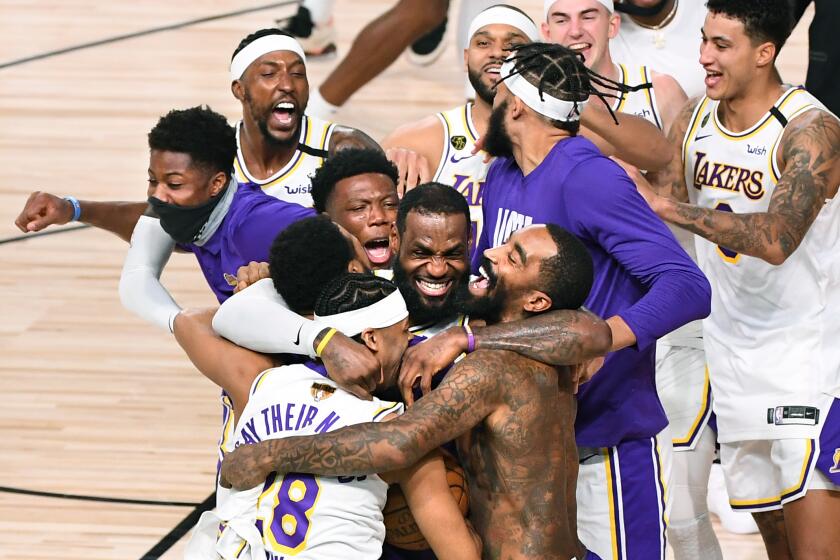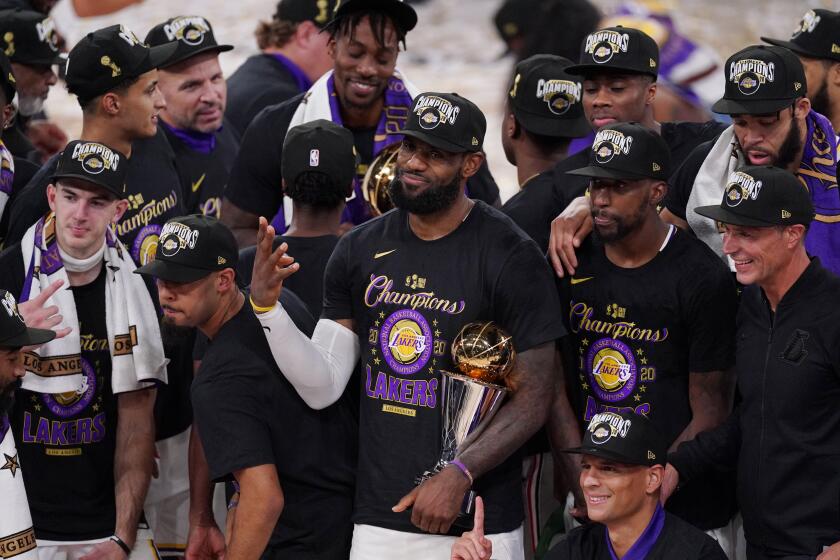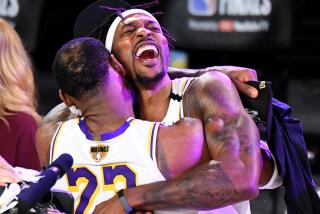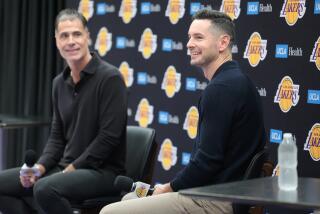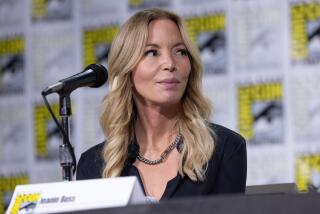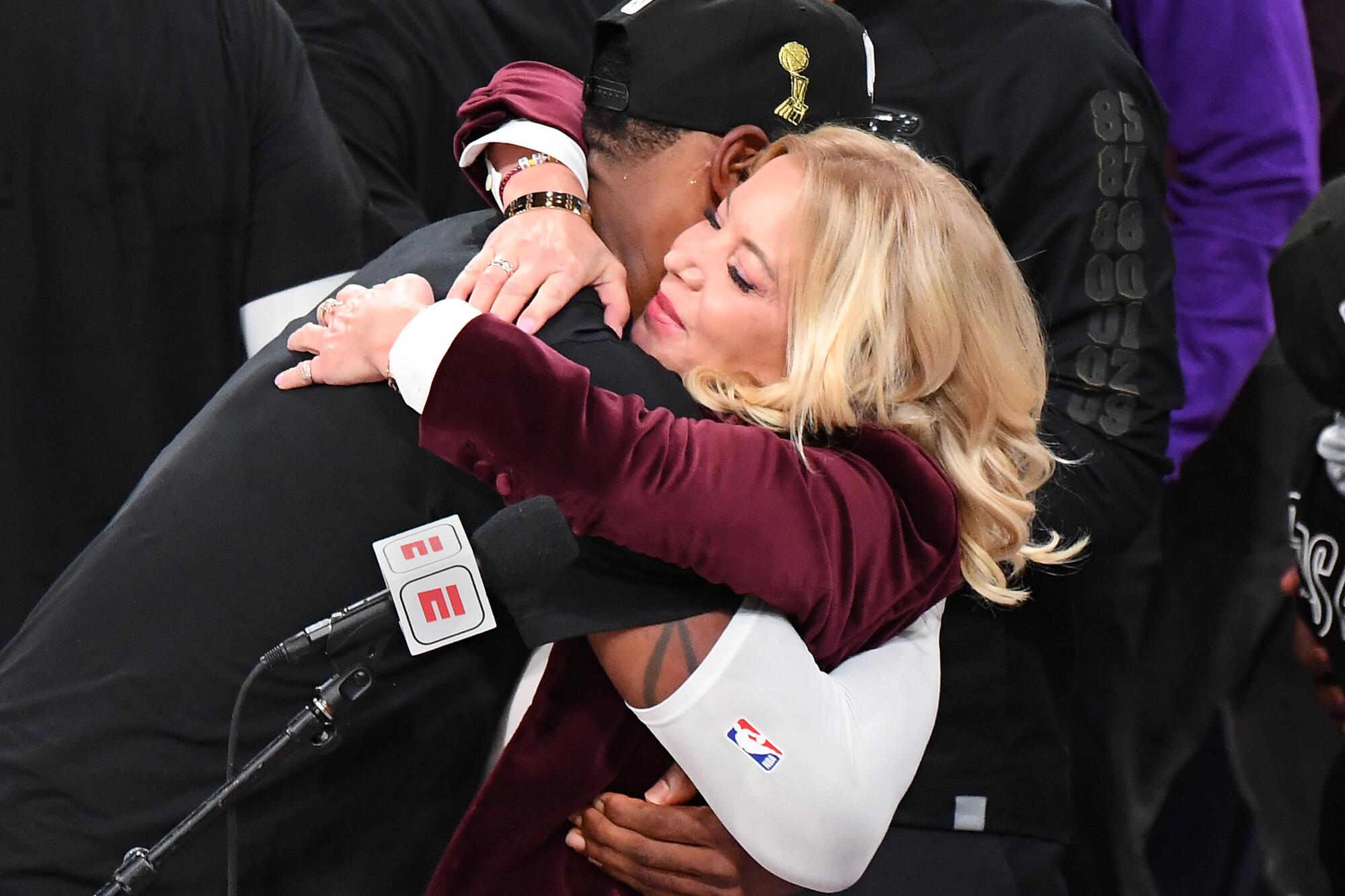
- Share via
ORLANDO, Fla. — The first thing Jeanie Buss felt when Game 6 of the NBA Finals neared its close was overwhelmed. This title-clinching moment was one she’d been waiting for — one she wasn’t sure she’d ever have. She felt excited for the players who’d accomplished it and the fans who’d waited with her.
Then it occurred to her that she had a job to do.
“I’m not a good public speaker, so I was worried I was gonna have a horrible case of stage fright and not find the words,” Buss said a day later. “Watching them celebrate together, that team is as close as any team I’ve ever seen.”
She’d prepared a few thoughts just in case, and as she made her way onto the court, the words came back to her. Then LeBron James found her with some words of his own as he embraced her tightly.
He told her he did what he came to do. This is what we wanted to accomplish, and we did it, she recalled him saying, paraphrasing his thoughts. She smiled and nodded as he spoke, closing her eyes for some of it.
“I think the hug for that long a time was to really let it soak in,” Buss said. “He’s won several championships now, and he knows that those moments are to be cherished and to be recognized.”
It’s something she knows as well.
On Sunday evening, Buss became the first female controlling owner to win an NBA championship.
“Hopefully not the last,” she said.
It closed a chapter in the franchise’s history that involved hard choices and stumbles, a chapter during which the team her father had turned into the NBA’s glamour franchise became a punchline. Her ability to lead was questioned, her friendships were scrutinized, and she tightened her circle to a smaller group of people she felt she could trust.
‘What she does is she leads with a really rare combination of courage and compassion.”
— Rob Pelinka, Lakers general manager and vice president of basketball operations
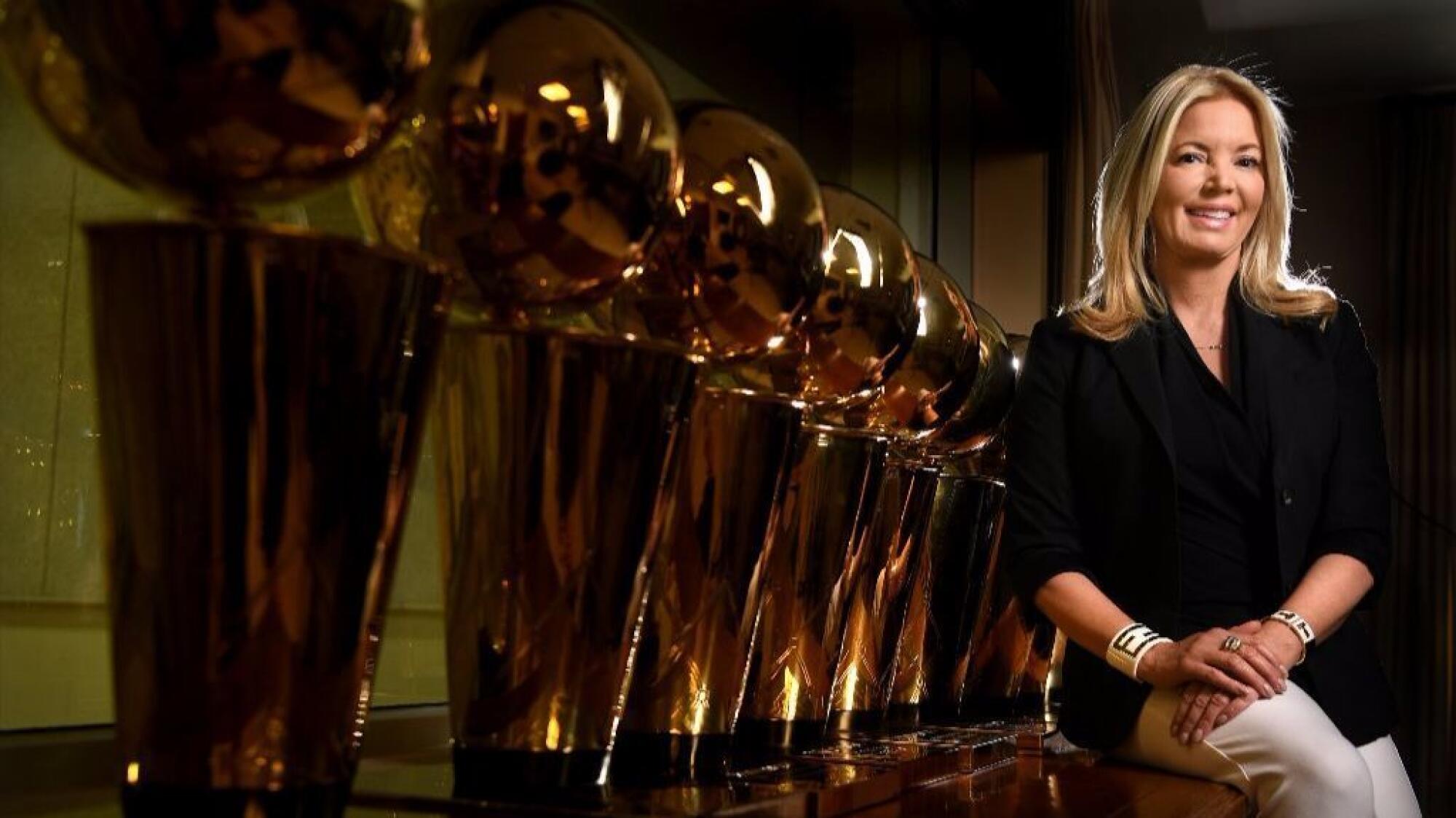
She found guidance in James. “Going through what I’ve gone through, the mud-slinging and the arrows and people, [James] even said it in his speech — the franchise wants respect, the front office wants respect, coach Vogel, he wants his damn respect,” Buss said. “When I was under fire and kind of unsure of what was coming at me next, I think of his strength in that. He doesn’t let that dictate how he responds to something. He stays true to himself.
“I’ve learned that that is something, that’s what everybody should strive to be. Stay true to their convictions and not listen to their detractors.”
::
When her father, Jerry Buss, bought the Lakers in 1979, the Boston Celtics had won 13 championships, more than twice as many as the Lakers, many coming at their expense. Basketball royalty didn’t live out West, and he wanted to change that.
Under his stewardship, the team won 11 titles. Their longest championship drought was 12 years, between 1988 and 2000. They missed the playoffs only twice.
Jerry Buss died in 2013, leaving the franchise to his children. He wanted Jeanie as the controlling owner and Jim to run basketball operations.
That summer, the Lakers failed to keep Dwight Howard, at the time a superstar center. During the spring of 2014, Jim promised the Lakers would be in contention for championships within three years.
But the Lakers needed to bring in help, and couldn’t do it. Both free agents, Carmelo Anthony said no in 2014 and LaMarcus Aldridge said no in 2015. The following summer, when the salary cap jumped and led to big deals for many players, the Lakers spent their money on Luol Deng and Timofey Mozgov. It hurt her to see the Lakers weren’t a coveted destination anymore. That, combined with constant coaching changes that didn’t seem to make sense, frustrated her.
Complete coverage from the Lakers’ championship season
As Jim Buss’ self-proclaimed timeline neared its close, Jeanie fired him, along with general manager Mitch Kupchak and former communications director John Black. She installed Magic Johnson as the team’s president of basketball operations and hired Rob Pelinka as general manager.
Buss says she couldn’t go through a proper search for the people who would manage the basketball side because that would have tipped off her brothers Jim and Johnny. They were attempting a coup to unseat her.
“What my brother was trying to do was take me out of being the controlling governor of the team,” she said. “He had found a legal team that was trying to find a loophole to take me out of that position, and the team would have been in chaos.”
A few weeks later, the coup attempt became public after Jeanie’s lawyers found a way to reassert her control.
The episode led to fissures in trust, and Buss turned to people she had known for years. She’d known Johnson since they were both teenagers. She’d known Pelinka for years because he was Kobe Bryant’s agent.
“What she does is she leads with a really rare combination of courage and compassion,” Pelinka said. “I think our Lakers culture is centered on making sure that the players have everything they need to succeed, and it’s a player-centric, player-first organization. That’s our culture, and she sets that.”
::
In 2017, Pelinka signed Kentavious Caldwell-Pope when the Detroit Pistons renounced their rights to him late during free agency. It was a chance to show James’ camp the team’s inner workings — Caldwell-Pope was represented by Klutch Sports’ Rich Paul, a longtime friend and associate of James. Paul became a regular at Lakers games, often sitting with Buss.
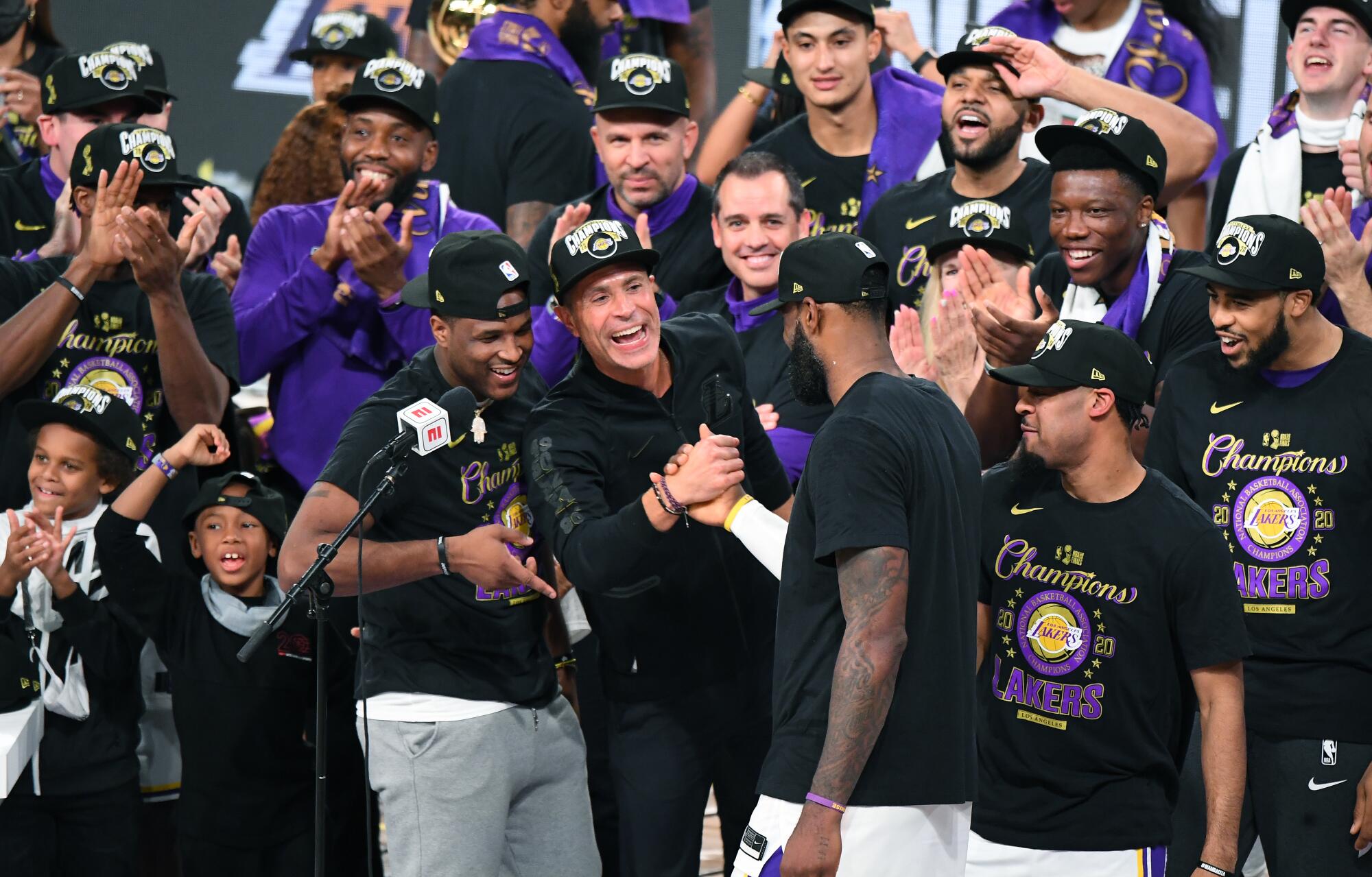
The Lakers struggled that year, too, missing the playoffs for a fifth year. That summer, James decided to join them, hoping to revive the downtrodden franchise. He made his final decision after meeting with Johnson, whose pitch helped confirm James’ decision.
Buss and James didn’t know each other at all. Eight months later, they met for their first dinner at a time when it became clear the Lakers would miss the playoffs again. James told her he’d been studying the franchise and how her father turned it into what it became.
“His point was to me that, it’s really special he put you in charge of something that he built and cared about so much and that you were the person he put in charge,” she said. “LeBron is a leader, he knows how to motivate. I think it was to remind me of that greatness. That we’d kind of lost where we were going and that trying to put it back to where we were was something that he wanted to be a part of.”
A month later, Johnson resigned during an impromptu news conference on the last day of the season without telling either of them he planned to do so.
“If things were bothering him, I never knew about that, and I wish that he would have spent time telling me what was bothering him,” Buss said. “Because I love Magic and I never want to see him in any kind of misery.”
Their relationship is still strong, and Buss credits Johnson with having stabilized the organization for James’ arrival.
Yet again, she tightened her circle.
She leaned on Linda Rambis, someone she’d worked with for decades and someone her father also had trusted. People began calling Rambis the team’s “shadow owner” and wondering why and to what extent she had power in the organization.
“I do think that there’s people that might be uncomfortable with women in power positions,” Buss said. “Whatever that triggered in other people that started the hatred or slinging the mud, whatever, calling her a shadow owner, things like that, was very demeaning and disheartening. Hurtful. But it didn’t change the mission at all. Didn’t change how we were gonna operate. Didn’t make me not trust her. Nothing can penetrate that 30 years of trust.”
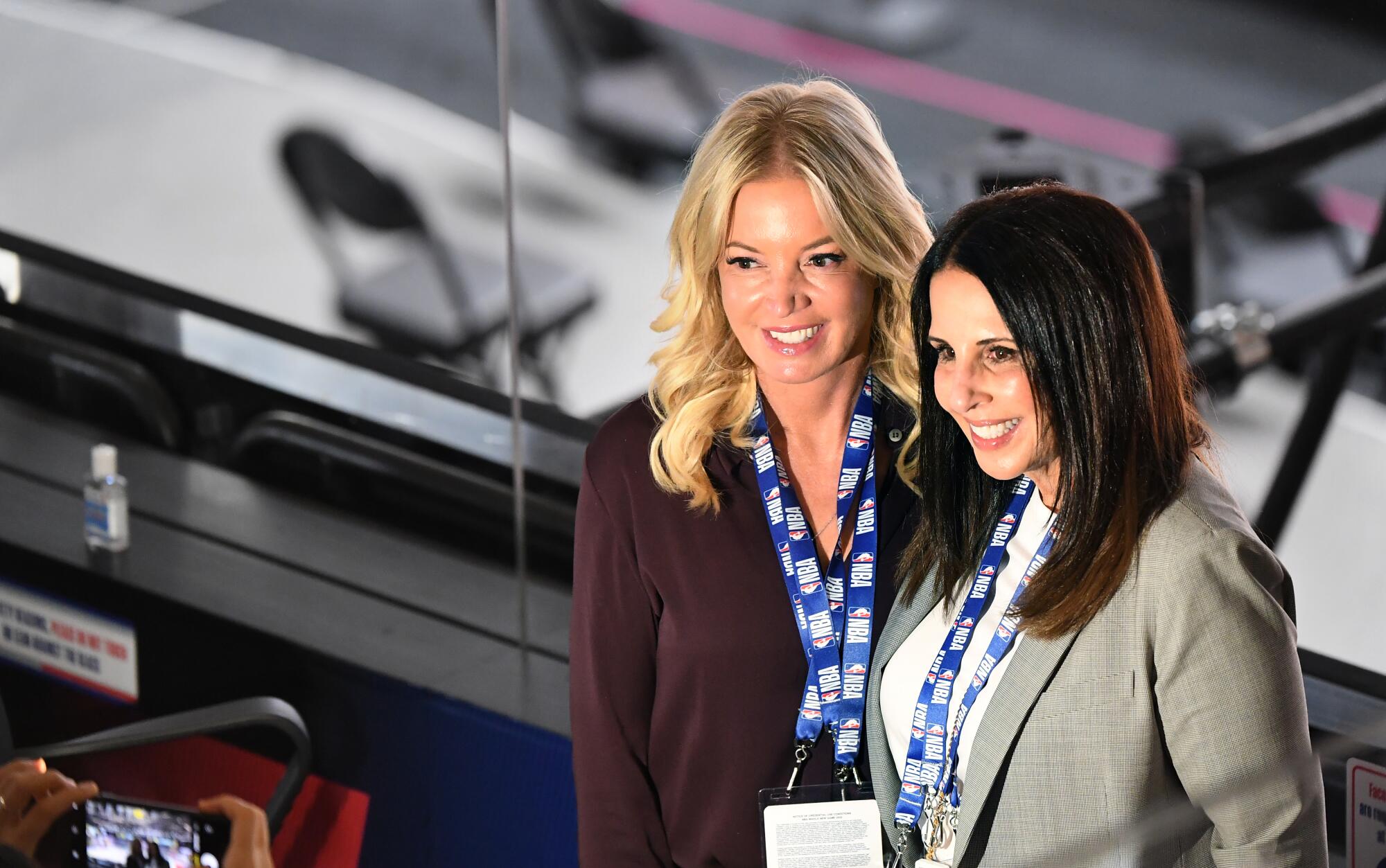
Buss’ inner circle included Kurt Rambis, Linda’s husband and a former Lakers player and coach; her younger brothers Joey, an alternate governor and vice president of research and development, and Jesse, the team’s assistant general manager and director of scouting; also, Tim Harris, the team’s chief operating officer and president of business operations.
“These are people who I trust with my life,” Buss said, specifically mentioning her younger brothers, the Rambises, Harris and Pelinka.
Pelinka’s power grew despite calls for his ouster.
“I know Rob, I know he is a man of integrity,” she said. “Professional. Extremely bright. Approaches things in analytical way. Is a problem solver. All the things that were going on in the media I don’t pay attention to because you can’t get validation from the media. … That never made me doubt him for a second.”
Luke Walton was fired as coach, and the search to replace him led to two prospects with whom negotiations fell apart in part because of low contract offers. Frank Vogel was hired, a move that was questioned. Then the Lakers gave up everything they legally could to trade for Anthony Davis.
Meantime, they offered very little comment on what was happening inside the organization.
“There’s an ease in conversation because if I say something that they may not agree with I don’t have to worry that it’s gonna be posted somewhere,” Buss said last week. “‘Jeanie made this dumb suggestion or Jeanie’s going off course here.’ That freedom, that trust, is so valuable to bounce off ideas and grow together.”
::
For the first week and a half of October, Buss stayed at the Waldorf Astoria in Orlando, a place that had become a second home for many just outside the bubble during the Finals.
What had been a relatively open environment became a second bubble. Guests were tested daily for COVID-19 instead of twice a week and they weren’t allowed to leave the hotel except to go to games.
With this year’s championship, the Lakers are the NBA’s greatest franchise, and LeBron’s James its best player.
Buss arrived after Game 1. Her brother Joey came for Game 1, and his family joined him. Her brother Jesse arrived in time for the end of the series.
“I think she’s an unbelievable owner; I think she’s a powerful woman,” James said last week. “I think what she believes in is an extension of her father, and continuing to build this legacy of this great franchise.”
She spent days with Linda Rambis, whose husband, Kurt, had been inside the bubble with the Lakers. Often Rich Paul joined them, their relationship having grown just as hers did with Pelinka during his years as the agent of the Lakers’ star player. Fara Leff, chief operating officer of Klutch Sports, often joined them as well.
“She’s bright and she brings an energy and ideas and creativity,” Buss said of Leff. “I love seeing women in this business take on a role like a COO of Klutch Sports. That’s so impressive. I see when they talk about the future of our business. I look at a Fara and go, if I could have been part of paving the way for her to choose to get into sports, that makes me proud.”
All of them got to go inside the bubble after the championship game and partied at a restaurant in the middle of Lake Dorado at the Coronado Springs Resort.
“I think I went to bed around 3:30 in the morning,” Buss said. “People have to remember the game didn’t end until 11:30. I hadn’t had dinner. Did I get up and dance a little bit? Yeah I did.”
The pandemic made the whole celebration feel like an intimate affair, even during the trophy presentation inside the nearly empty arena. It was a small celebration with only their closest family and friends.
For an organization that turned inward to reach these heights, it was, in many ways, fitting.
More to Read
All things Lakers, all the time.
Get all the Lakers news you need in Dan Woike's weekly newsletter.
You may occasionally receive promotional content from the Los Angeles Times.
